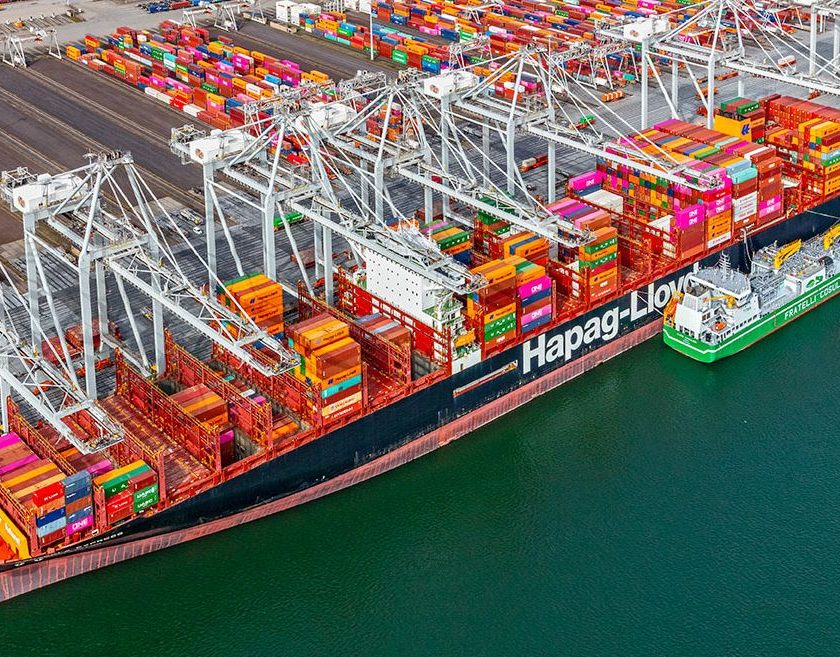Hapag-Lloyd nears full adoption of eBLs
NewsHapag-Lloyd takes progresses towards full eBL adoption by partnering with GSBN to implement the IQAX eBL solution.
Titan says bunkering large quantities of liquefied biomethane is possible and scalable after milestone bunkering of Hapag-Lloyd’s containership.

Titan Clean Fuels and STX Group have bunkered 2,200 metric tons of liquefied biomethane (LBM) to a Hapag-Lloyd container vessel in Rotterdam, marking the company’s first use of LBM as sustainable fuel, in what is the largest ship-to-ship bunkering operation to date.
The bunkering operation was carried out by Titan’s Alice Cosulich LNG bunker vessel to Hapag Lloyd’s Brussels Express container ship. The Germany-flagged New Panamax container ship was built in 2014 and has a carrying capacity of 15,000 TEU.
Dual-fuel Brussels Express was converted to LNG back in 2019, becoming the world’s first large container ship to have been converted to gas propulsion.
The vessel can run both on liquefied biomethane, fossil LNG and conventional fuel.
According to Hapag-Lloyd, LBM will be bunkered into the same tank as the fossil LNG. As explained in a statement sent to WorldCargo News, both fuel types are compatible and will be used in the main engine, the auxiliary engines and the boiler in case needed. This is regardless, whether they are run during sea passages or in port.
“This pioneering deal demonstrates that bunkering large quantities of liquefied biomethane is possible and scalable. However, there is still more progress required regarding the necessary infrastructure and the regulatory framework. For us, bunkering liquefied biomethane is another measure in our step-by-step approach to further decarbonize our operations to reach our goal of becoming net-zero by 2045,” said Jan Christensen, Senior Director Fuel Purchasing at Hapag-Lloyd.
“We have been encouraged by the demand for LBM so far, and this major bunkering represents a significant step in shipping’s clean fuels transition. Titan recognizes the LNG pathway via LBM and renewable e-methane as a practical, sustainable and cost-effective route to net-zero shipping emissions available today. We work every day towards full regulatory compliance for shipowners and operators of deep sea ships,” said Caspar Gooren, Director of Renewable Fuels at Titan Clean Fuels.
“This transaction is a proof of how liquefied biomethane can be a powerful tool on the path to a lower carbon transport sector. At STX Group, we are proud to consistently be at the forefront of environmental markets and this is yet another example of how we are building long-term value through high-impact use cases,” said Sead Keric, Managing Partner of Renewable Gas at STX Group.
Liquefied biomethane (LBM), also known as bio-LNG, can even be net-zero emission depending on the feedstock and is commercially available in Europe, Asia and North America. Titan said that biomethane is produced from sustainable biomass feedstocks such as industrial and agricultural waste streams that do not compete with food production.
LBM can be delivered in the form of physical molecules or “Mass Balanced” whereby biomethane is injected into the gas network and transported to liquefaction plants and LNG terminals using the existing infrastructure through a system of mass balancing.
By subscribing you will have: